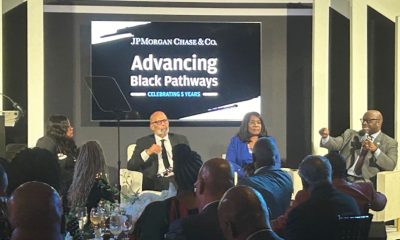Government
Maryland County Executives Back Drug Affordability Board
THE AFRO — Maryland lawmakers are taking action to manage prescription drug prices and gouging, by working to create a Prescription Drug Affordability Board in the state.
Maryland lawmakers are taking action to manage prescription drug prices and gouging, by working to create a Prescription Drug Affordability Board in the state.
On Jan. 3 County executives from throughout the state of Maryland met in order to support the proposal for a drug affordability board in hopes of reducing the rising health care costs.
“Proud to stand with leaders across the state to support legislation to keep prescription drug costs affordable for all,” Prince George’s County Executive Angela Alsobrooks wrote on Twitter.
“We know that these drugs can be sold for a lot less money. It’s done in other countries. Maryland has always been a leader, and we can lead on this,” said Anne Arundel County Executive Steuart Pittman.
Maryland has definitely been a leader in the fight for pharmaceutical prices. First introduced in spring 2017, Maryland lawmakers worked on legislation, HB 631, to prevent price gouging of generic drugs, the first of its kind in the country. Set to take effect in October of 2017, HB 631 would have prevented generic pharmaceutical companies from “unconscionable increases,” according to FDA Law Blog. In addition, the bill authorized the Maryland Medical Assistance Program (MMPA) to notify the attorney general when the Wholesale Acquisition Cost (WAC) of a prescription drug increases by at least 50 percent from the cost from the preceding year, if the price paid by MMAP would increase by at least 50 percent or if the WAC for a 30-day supply or full course of treatment is more than $80.
However the Association for Accessible Medicines (AAM) filed a lawsuit against the state of Maryland for their efforts to regulate price gouging, particularly in regards to HB 631. In October of 2018 Maryland Attorney General Brian Frosh worked for SCOTUS to review the bill.
Despite the battle against generic pharmaceutical companies, other states such as Colorado, Illinois, Louisiana, Massachusetts, Minnesota, New York, Rhode Island, Tennessee, Vermont and nearby in Virginia were inspired by Maryland’s efforts to combat price gouging, according to the National Conference on State Legislatures.
The Prescription Drug Affordability Board, introduced by s Joseline Pena-Melnyk (D) and Baltimore County Senator Kathy Klausmeier (D), is yet another means of Maryland stepping up to take a stand against rising pharmaceutical costs.
While all the leaders agreed there is a need for regulating price gouging, some mentioned the concern over rising costs as they work to cover County employees.
“I remind folks that even on the local government level, really the escalating costs each year, for employees throughout local government, really has become unsustainable,” said the sole Republican County Executive Barry Glassman, who represents Harford County, according to an article featured on the “Health Care for All” website from {The Daily Record}. “Each year we have to choose between whether we are going to give our employees a raise or if, in fact, we are going to cover some of their prescription costs. You can imagine for a local government, a local family, that these costs are just becoming unmanageable for any working family, any working government.”
Similarly to HB 631, even if the drug affordability board is supported legislatively in Maryland, it will likely face opposition and legal challenges from pharmaceutical companies. However, the creation of a board will be a major topic during the upcoming legislative session.
This article originally appeared in The Afro.
Activism
Oakland Post: Week of April 17 – 23, 2024
The printed Weekly Edition of the Oakland Post: Week of April 17 – 23, 2024

To enlarge your view of this issue, use the slider, magnifying glass icon or full page icon in the lower right corner of the browser window. ![]()
California Black Media
Yahushua’s Law: Senate Advances Bill to Protect Students from Extreme Weather
In a significant move towards student safety, the California Senate Education Committee passed Senate Bill (SB) 1248, also known as Yahushua’s Law, on April 3. The bill is named in memory of Yahushua Robinson, a 12-year-old student from Lake Elsinore, who tragically died due to a heat-related illness during a physical education class in 2023. It is a pioneering effort to prevent similar incidents in the future.

By California Black Media
In a significant move towards student safety, the California Senate Education Committee passed Senate Bill (SB) 1248, also known as Yahushua’s Law, on April 3.
The bill is named in memory of Yahushua Robinson, a 12-year-old student from Lake Elsinore, who tragically died due to a heat-related illness during a physical education class in 2023. It is a pioneering effort to prevent similar incidents in the future.
Authored by Senator Melissa Hurtado (D-Bakersfield) and co-authored by Assemblymember Akilah Weber, M.D. (D-La Mesa), SB 1248 directs the California Department of Education to develop comprehensive guidelines for schools regarding student activity during all extreme weather conditions.
“No student should ever lose their life on campus to extreme weather when we can take steps to protect them by preparing statewide plans to minimize exposure to the most harmful elements of exposure,” Hurtado said after introducing SB 1248.
The bill stipulates that schools must implement safety measures which include monitoring weather forecasts, postponing or relocating outdoor activities during hazardous conditions, and ensuring students have proper hydration and access to shade. It also requires schools to establish clear communication plans to keep parents, teachers, and students informed about potential weather hazards.
Supporters of the bill include the Robinson family, advocate Christina Laster, Bold Enterprises LLC, California Black Women’s Collective Empowerment Institute, Familias Empoderadas del Valle Central National Action Network, The Black Student Advocate, and the Ventura County Alumnae Chapter of Delta Sigma Theta Sorority.
Thanking Hurtado for introducing this crucial legislation, Weber said, “The story of Yahushua Robinson last year was heartbreaking. We have protections for farm workers and other industries in the case of extreme weather, now climate change is forcing us to also extend similar protections to students at school.”
City Government
LAO Releases Report on Racial and Ethnic Disparities in California Child Welfare System
Racial inequalities in California’s child welfare system disproportionately impact poor Black and Native American children, according to a report released April 3 by the nonpartisan Legislative Analyst’s Office (LAO). The report, which was presented to the Assembly Subcommittee No. 2 on Human Services — chaired by Assemblymember Corey Jackson (D-Moreno Valley) — states that the proportion of low-income Black and Native American children in foster care is four times larger than other racial and ethnic groups in the state.

Racial inequalities in California’s child welfare system disproportionately impact poor Black and Native American children, according to a report released April 3 by the nonpartisan Legislative Analyst’s Office (LAO).
The report, which was presented to the Assembly Subcommittee No. 2 on Human Services — chaired by Assemblymember Corey Jackson (D-Moreno Valley) — states that the proportion of low-income Black and Native American children in foster care is four times larger than other racial and ethnic groups in the state. Half of the children from each racial group has experienced some level of child welfare involvement before reaching legal age.
Jackson is a member of the California Legislative Black Caucus.
“Racial and ethnic disproportionality and disparities are present within initial allegations and persist at all levels of the system — becoming the most pronounced for youth in care,” the report states.
The disparities have persisted over the last decade across the state, the LAO found, adding that Black children living in poverty are more likely to enter foster care. State data shows that there is a correlation between poverty and foster placement in each county.
“Throughout all levels of the child welfare system, families experiencing poverty are more likely to come to the attention of and be impacted by the child welfare system,” stated the report.
Overall, the report revealed that more than half of the families affected by the state child welfare system earn $1,000 per month, significantly less than the national average of $5,000 a month.
The financial disparities highlighted in the LAO report align with existing research indicating that poverty is among the main factors contributing to the likelihood of child maltreatment. State anti-poverty programs include cash aid, childcare subsidies, supportive housing, and nutrition assistance.
-

 Activism4 weeks ago
Activism4 weeks agoOakland Post: Week of March 20 – 26, 2024
-

 #NNPA BlackPress3 weeks ago
#NNPA BlackPress3 weeks agoCOMMENTARY: D.C. Crime Bill Fails to Address Root Causes of Violence and Incarceration
-

 #NNPA BlackPress4 weeks ago
#NNPA BlackPress4 weeks agoFrom Raids to Revelations: The Dark Turn in Sean ‘Diddy’ Combs’ Saga
-

 #NNPA BlackPress3 weeks ago
#NNPA BlackPress3 weeks agoMayor, City Council President React to May 31 Closing of Birmingham-Southern College
-

 #NNPA BlackPress4 weeks ago
#NNPA BlackPress4 weeks agoCOMMENTARY: Lady Day and The Lights!
-

 Activism3 weeks ago
Activism3 weeks agoOakland Post: Week of March 27 – April 2, 2024
-

 #NNPA BlackPress4 weeks ago
#NNPA BlackPress4 weeks agoBaltimore Key Bridge Catastrophe: A City’s Heartbreak and a Nation’s Alarm
-

 #NNPA BlackPress4 weeks ago
#NNPA BlackPress4 weeks agoBaltimore’s Key Bridge Struck by Ship, Collapses into Water


















































